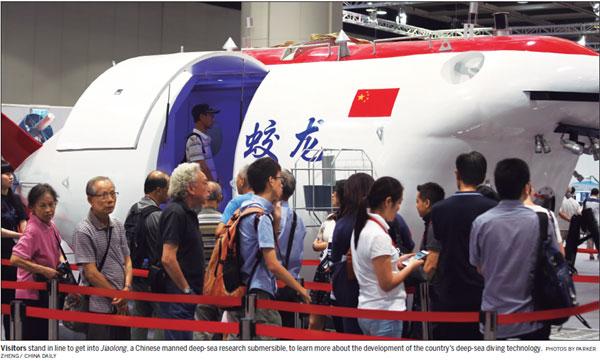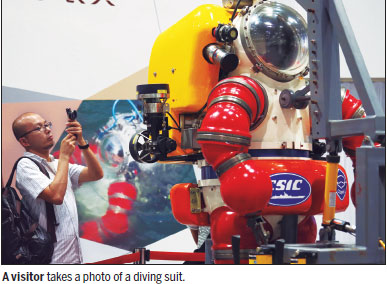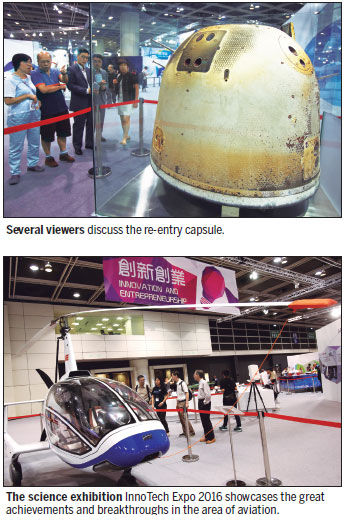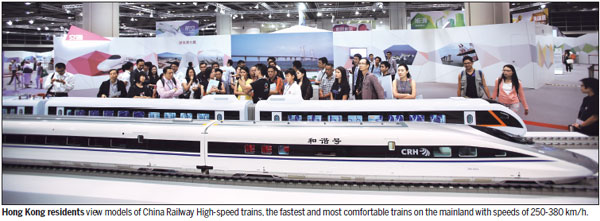Expo showcases nation's innovation development
Updated: 2016-09-30 08:49
By Willa Wu in Hong Kong(HK Edition)
|
|||||||||
A forward-looking exhibition on China's prowess in high-tech is set to climax on the National Day
A weeklong science and technology expo featuring innovation achievements in Hong Kong and the mainland aimed at encouraging ideas for the city's high-tech development.
InnoTech 2016, organized by the local think tank Our Hong Kong Foundation, is being held at the Hong Kong Convention and Exhibition Centre from Sep 24 to Oct 1.
Eight display zones were set up with 50 national-level science and technology achievements from the fields of spaceflight, aviation, deep-sea diving, information technology, health, energy, transportation, and innovation. Special areas were also dedicated for visitors to experience the latest technology.
Among the exhibitions, a 1:1 model of Jiaolong - a Chinese-made deep-sea research submersible which has the greatest depth range of any manned research vehicle in the world - has attracted the most visitors, who waited one or two hours for a two-minute look inside Jiaolong's cabin.
In the country's scientific development drive, Hong Kong is tipped to play a bigger part. Li Meng, vice-minister of Science and Technology, told the expo that Hong Kong should gear up for a greater role in the nation's science and technology development.
He praised Hong Kong for its active participation in technology exchange with the mainland in the past four years. He said 472 Hong Kong researchers have joined 143 national science and technology programs, and 109 Hong Kong institutions took part in 93 national research projects between 2011 and 2015, according to ministry statistics.
The expo also has featured the series "Hong Kong Creates". The Hong Kong Baptist University displayed its award-winning ultra-hard, non-fragile and scratch-resistant submicron thin film that can be applied to touch-screen devices.
Meanwhile six universities in the city, including the University of Hong Kong and the Hong Kong University of Science and Technology, have established partnerships with 16 key national laboratories since 2005, building 16 partner laboratories in Hong Kong covering the fields of public health, energy, and environment, according to official documents.
Apart from the displayed items, the expo had lectures by seven leading scientists who introduced their pioneering breakthroughs.
Chief scientist of the world's first quantum science satellite Mozi Pan Jianwei talked about China's leading role in the application of quantum information technology. Xu Ying, the youngest invited scientist and a major developer of the Beidou Navigation Satellite System, presented the system to Hong Kong people, showing diversified applications in the areas of communication, transportation and logistics transactions, marine fisheries, earthquake relief, weather forecasting and forest fire prevention.
Some eleven themed forums, featuring renowned scientists from both the mainland and Hong Kong, were held to discuss the future of Hong Kong's science and technology development. Experts from both sides agreed that the city is experiencing the best era for scientific development since the Hong Kong government updated its development vision.
Last year, the SAR government established the Innovation and Technology Bureau (ITB). The bureau is set to formulate holistic policies relating to innovation and technology; strengthen coordination among the government, industry, academia and research sectors; and expedite the development of innovation, technology and related industries in Hong Kong, according to a government statement.
Hong Kong has scored a number of scientific breakthroughs in recent years. Nancy Ip Yuk-yu and her team in the Hong Kong University of Science and Technology found a kind of human protein which could effectively enhance the memories of lab mice. She said her team was now working on applying these findings to human beings. This is in an attempt to treat Alzheimer's disease, a chronic neurodegenerative disease.
Xu Yangsheng, president of the Chinese University of Hong Kong (CUHK) (Shenzhen) and a robotics expert, unveiled the invention of his team at CUHK - purpose-oriented robots such as the world's first cloth climbing robot and interactive robots mainly designed for elderly people who live alone.
Dean of Engineering (part-time) of CUHK Wong Ching-ping said the city has played a leading role in the world in collecting and storing solar energy, an ideal alternative to fossil fuels.
Another group of experts appealed to the public for support in transforming Hong Kong into a smart city.
"If companies are willing to cooperate with universities and provide necessary funding and facilities, more capable students will enter the fields of science and technology. This is the backbone of building smart cities," said Man Kim-fung, chair professor of the Department of Electronic Engineering in City University of Hong Kong.
The expo has already had 36,050 visitors by Thursday. On the expo's website, 48,000 people booked their visits on National Day when the expo will feature a series of events that enable parents and children to experience technology and have fun together.
willa@chinadailyhk.com






(HK Edition 09/30/2016 page6)